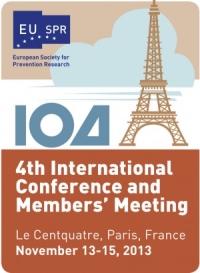13th to 15th November 2013, Paris, France
It is well known that differences in health and wellbeing within and between populations are influenced by a range of biological and social factors. However, less attention has been given to identifying how differences in these factors may influence the experiences or outcomes of prevention work. Prevention interventions and policies may also inadvertently generate health and social inequalities by disproportionately benefiting some populations, to the disadvantage of others.
The development of frameworks such as PROGRESS Plus (Place of residence, Ethnicity, Occupation, Gender, Religion, Education, Socio-economic status, Social capital, Age, Disability and Sexual Orientation) has helped to provide a focus for research, but how do these factors influence intervention outcomes, and how do we design prevention policies and programmes which take them into account?
This year’s EUSPR Conference will focus on the important role of modifiers of prevention outcome, and examine the best ways in which diversity can be incorporated into research and practice. Keynote speakers will present the latest findings from research investigating modifying factors such as age, gender, ethnicity, family and socioeconomic status. The call for abstracts for parallel sessions on these themes is now closed.
This year we will also be holding dedicated sessions for PhD students and Early Career Researchers to present their work.
We are also extremely pleased that pre-conference workshops will be held in collaboration with the Science for Prevention Academic Network (SPAN) project, which aims to support the development of prevention science education across the EU.
Download the conference flyer for more details.
Click here for online registration.
Venue:
Le Centquatre,
5 Rue Curial,
75019 Paris, France
Tip: More up to date educational events dealing with healthcare can be found online on the Education Database »medicine & health«.
